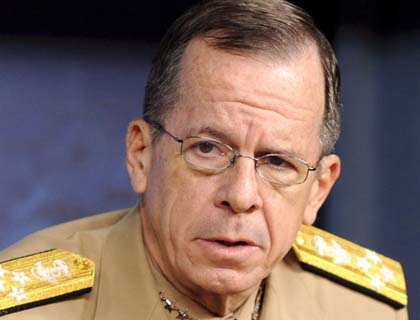KANDAHAR - It is unclear if the United States will be able to pay troops on time in the event of a debt default, the top U.S. military officer told troops in Afghanistan on Saturday. Admiral Mike Mullen, chairman of the U.S. military's Joint Chiefs of Staff, said Pentagon officials were working hard to plan for a potential default but cautioned that the circumstances were extraordinary.
"So I honestly can't answer that question," he told troops at Kandahar air base in southern Afghanistan, as several expressed anxiety over budget wrangling in Washington.
Potentially suspending pay to U.S. forces waging wars in Afghanistan and Iraq is an extremely sensitive subject in the United States and Mullen acknowledged that many troops lived paycheck to paycheck.
"So if paychecks were to stop, it would have a devastating impact," Mullen said, answering questions from troops.
"I'd like to give you a better answer than that right now, I just honestly don't know," he said.
The United States has warned that it will run out of money to pay all of its bills after August 2 without a deal from Congress to raise a $14.3 trillion debt ceiling. Where U.S. troops fall in priority for payment in a default has not been made clear.
With $172 billion of revenue between August 3 and August 31, the U.S. Treasury could fully fund Social Security payments, Medicare and Medicaid, interest on the debt, defense vendor payments and unemployment insurance, found a study by the Washington-based Bipartisan Policy Center.
But that would leave entire government departments -- such as Labor, Commerce, Energy and Justice -- unfunded, and many others unpaid, like active-duty troops and the federal workforce.
Mullen said he believed that troops would be paid eventually, regardless of what happens.
"I have confidence that at some point in time whatever compensation you were owed you will be given," he said.
"But I don't know mechanically exactly how that would happen. And it is a huge concern."
He played down the possibility that a default would undercut military operations or force the U.S. defense department into a partial shutdown, saying "we're going to continue to come to work."
"I don't expect it will affect -- certainly in the short term -- operations here or operations around the world," Mullen later told another gathering of troops at Camp Leatherneck, in Helmand province.
While a group of congressmen pushed forward a bill this week to ensure that the active military servicemen still get paid in the case of default, there's no firm plan yet.
The White House hasn't made any assurances and neither has the Treasury Department.
Some financial organizations that service military clients, like USAA and the Andrews Federal Credit Union, have stepped up to say that they will advance pay if there is a default. (Reuters)

